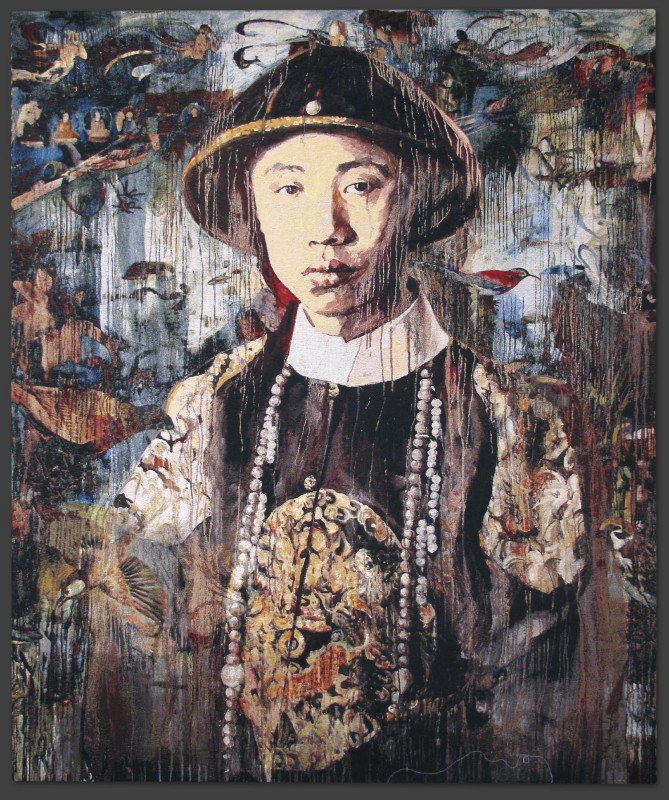
Jacquard tapestry
103 x 79 in.
edition of 6
In Last Emperor, reknowned Chinese-born artist Hung Liu revisits Pu Yi, the last emperor of China, whose court was the subject of her extraordinary “Last Dynasty” series in the 1990s. Named emperor in 1908 at the tender age of two, Pu Yi’s childhood was a bizarre exercise in extremes: living in utter isolation but with no privacy, surrounded by silent eunuchs, “he was confined like a little prisoner,” says the artist. Indulged and coddled but perpetually manipulated by outside interests, he lived as a pampered playboy with few real friends: his beloved English tutor was a British agent; his wife’s nickname for him was “eunuch.” Eventually installed by the Japanese as the puppet emperor of Manchukuo, Pu Yi was subsequently sentenced by the communist regime to a decade in jail where he was “reformed” (and finally learned to tie his shoes); he died in 1967, a humble gardener employed at the Beijing Botanical Gardens.
As in Baby King, a 1995 painting by Liu, the Last Emperor tapestry depicts Pu Yi at age seventeen – “on the eve of his marriage to two women and still unable to tie his shoes,” writes Jonathan Binstock of Baby King, “he seems overcome by the fear of an uncertain future” – the personification of a crumbling empire and the trappings of power.
Whereas the veil-like drips of linseed oil in Liu’s earlier paintings of Pu Yi impart a sense of melancholy, as if mourning the young emperor’s lost childhood, the artist’s Last Emperor tapestry places her royal subject in an altogether different context. Woven in Belgium using 17,800 warp threads, the tapestry surrounds Pu Yi with a constellation of colorful ancillary figures; its woven translations of Liu’s linseed drips act as agents of unity and protection, rather than disintegration. The spirited birds, flowers, and apsaras (flying angels) which encircle the emperor speak to a joy and freedom absent from his searching expression, yet almost certainly central to his innermost dreams. Elegiac but teeming with life, Last Emperor is a moving and sensitive portrait of a young man powerless over his own dynasty and destiny, eulogized by biographer Edward Behr as “a man kidnapped by history.”
show prices
Prices and availability are subject to change without notice.The copyright of all art images belongs to the individual artists and Magnolia Editions, Inc.
©2003-2024 Magnolia Editions, Inc. All rights reserved. contact us
